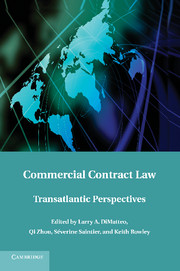Book contents
- Commercial Contract Law
- Commercial Contract Law
- Copyright page
- Dedication
- Brief Contents
- Contents
- Contributors
- Foreword
- Part I The Role of Consent
- Part II Normative Views of Contract
- Part III Contract Design and Good Faith
- Part IV Implied Terms and Interpretation
- Part V Policing Contracting Behavior
- 12 The Paradox of the French Method for Calculating the Compensation of Commercial Agents and the Importance of Conceptualising the Remedial Scheme under Directive 86/653
- 13 Unconscionability in American Contract Law
- 14 Unfair Terms in Comparative Perspective
- 15 (D)CFR Initiative and Consumer Unfair Terms
- Part VI Misrepresentation, Breach, and Remedies
- Part VII Harmonizing Contract Law
- Index
12 - The Paradox of the French Method for Calculating the Compensation of Commercial Agents and the Importance of Conceptualising the Remedial Scheme under Directive 86/653
from Part V - Policing Contracting Behavior
Published online by Cambridge University Press: 05 February 2013
- Commercial Contract Law
- Commercial Contract Law
- Copyright page
- Dedication
- Brief Contents
- Contents
- Contributors
- Foreword
- Part I The Role of Consent
- Part II Normative Views of Contract
- Part III Contract Design and Good Faith
- Part IV Implied Terms and Interpretation
- Part V Policing Contracting Behavior
- 12 The Paradox of the French Method for Calculating the Compensation of Commercial Agents and the Importance of Conceptualising the Remedial Scheme under Directive 86/653
- 13 Unconscionability in American Contract Law
- 14 Unfair Terms in Comparative Perspective
- 15 (D)CFR Initiative and Consumer Unfair Terms
- Part VI Misrepresentation, Breach, and Remedies
- Part VII Harmonizing Contract Law
- Index
Summary
In 1986, the Council of Ministers of the European Union enacted Directive 86/653 on self-employed commercial agents. The Directive was implemented in English law by the Commercial Agents (Council Directive) Regulations 1993 (thereafter the Agency Regulations) which came into effect on 1 January 1994. The Directive and the Agency Regulations have been held to be in the nature of mandatory law so that they apply where a commercial agent acted in the UK for a Californian principal under a contract governed by Californian law (Ingmar GB Ltd v. Eaton Leonard Inc.).
The Directive is based on the civil law assumption that commercial agents are in need of protection (France and Germany), which is in direct contrast with the traditional English common law position that principals are the ones who deserve protection. When the Agency Regulations came into force, confusion arose because they introduced a level of protection for commercial agents on termination, by way of the civil law concepts of “compensation” and “indemnity”, which are alien to traditional English common law. In implementing the Directive, the UK, alone amongst EU Member States, chose not to opt for one remedy – either “compensation” or “indemnity” – but provided for both to be available and the choice between the two to be made by the parties. When applying the “compensation” option, the UK courts have shown a remarkably methodological approach emphasising the need to conceptualise the notion of “loss” before quantifying it (Lonsdale v. Howard and Hallam Ltd). This is in contrast with France, where the implementation and interpretation of the Directive is consistent with the French legal tradition. The result has been an implementation that appears inconsistent and (perhaps) unduly harsh on the principal.
The aim of this chapter is to study the impact of the differences in implementation among France, Germany and the UK and propose a solution to reconcile such differences. This chapter will first consider the nature and rationale of such remedies to see how they differ from common law concepts. The chapter then critically considers the French system and compare it with the common law courts which appear to have applied such concepts with a, perhaps, unexpected ease. The author offers a solution to unify the damage-related nature of “compensation” and the restitutionary nature of “indemnity” – by viewing the principal-agent relationship as a quasi-joint venture. Using a “reverse un-equitable enrichment approach,” it is possible to argue that the aim of both termination payments under the Directive is to compensate or indemnify the commercial agent for his loss.
- Type
- Chapter
- Information
- Commercial Contract LawTransatlantic Perspectives, pp. 289 - 308Publisher: Cambridge University PressPrint publication year: 2013
- 1
- Cited by

